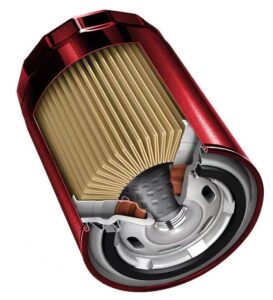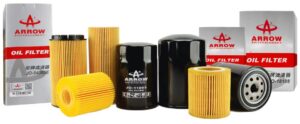The bypass valve, also known as the safety valve, is a crucial component in oil filters. It ensures a stable supply of oil to the engine, preventing oil starvation due to a clogged oil filter. Engineers incorporate the bypass valve to provide an alternative route for oil to flow directly to the engine, bypassing the filter material when necessary.
Working Mechanism of the Bypass Valve
The bypass valve in an oil filter operates based on oil pressure. When the filter media becomes clogged, oil struggles to pass through, causing an increase in pressure within the filter housing. Once the pressure exceeds the spring force of the bypass valve, the spring compresses, opening the valve and allowing oil to flow around the filter material to the engine components.
Without a bypass valve, or if the oil filter is not replaced regularly, excessive clogging can lead to reduced oil flow in the lubrication system. This can result in inadequate lubrication of moving parts, causing severe friction and potential engine damage.
In addition to lubrication, oil serves several functions, including cooling, cleaning, and maintaining pressure differentials. A decrease in oil supply can lead to elevated engine temperatures, increased wear from metal debris, and reduced oil pressure, which may restrict the operation of oil-driven components like the VVT chain, timing chain tensioners, and hydraulic lifters.
Performance Indicators of the Bypass Valve
- Precise Opening Pressure
The bypass valve’s primary role is to remain closed under normal conditions to ensure oil flows through the filter. The precise adjustment of the spring force that determines the valve’s opening pressure is critical.- A. Excessive Spring Force
If the spring force is too high, the bypass valve may not open in a timely manner, preventing oil pressure from overcoming the spring resistance. This delays oil supply, leading to inadequate lubrication of engine parts, increased wear, and potential mechanical failures over time. - B. Insufficient Spring Force
Conversely, if the spring force is too low, the bypass valve may become overly sensitive, opening at lower pressures. This allows unfiltered oil to flow excessively to engine components, increasing the presence of contaminants and particles in the oil. Such conditions can negatively impact engine performance and longevity, leading to decreased fuel efficiency, increased emissions, and a higher risk of engine failure.
- A. Excessive Spring Force
- Rust Resistance
Oil filters can be exposed to humid environments during transportation and storage, risking rust formation on metal components. Rust not only affects the appearance of parts but also their functionality.- A. Rust Issues with the Bypass Valve
If the bypass valve rusts, its opening and closing actions may be hindered, resulting in a delayed response to pressure changes. This sluggishness can disrupt oil flow and compromise the efficiency of the entire lubrication system. - B. Importance of Rust Resistance
Therefore, the rust resistance of the bypass valve is a significant performance indicator. High-quality materials and surface treatments can effectively prevent rust, enhancing the valve’s stability and lifespan. Improved rust resistance ensures reliable operation of the bypass valve, contributing to the overall reliability of the oil filter and, consequently, the engine’s performance.
- A. Rust Issues with the Bypass Valve
These aspects of precision control and material selection are essential in designing high-performance oil filters.
ARROW Oil Filter’s Bypass Valve
ARROW oil filter’s bypass valve utilizes a riveting process, ensuring secure and reliable component connections. It features high-quality springs and valves, guaranteeing precise opening pressure and consistent performance. As a vital component of the lubrication oil circulation system, the oil filter’s safety and filtration directly impact engine longevity.
The bypass valve, as part of the oil filter, has numerous technical design requirements and quality standards. This highlights that oil filters are far more sophisticated than merely preventing leaks. The attention to detail reflects ARROW’s commitment to high-quality standards, positioning it as a leading Chinese brand capable of competing with major international brands. Upholding the philosophy of “good filter media, true filtration,” ARROW filters are dedicated to serving millions of car owners worldwide.





